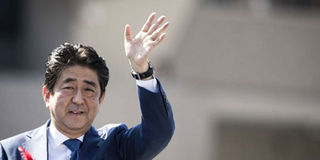Shinzo Abe eyes big win in snap Japan vote

Japan's Prime Minister and ruling Liberal Democratic Party president Shinzo Abe waves to supporters during an election campaign in Yaizu, Shizuoka prefecture, on October 11, 2017. PHOTO | BEHROUZ MEHRI | AFP
What you need to know:
- Conservative premier Abe, 63, is facing an unexpected and fierce challenge from the media-savvy Yuriko Koike.
- The key domestic battleground is the economy, once the envy of the world but now struggling to break out of a deflationary spiral and weighed down by debt and an ageing population.
- The latest surveys show that Abe's LDP will secure as many as 300 seats.
TOKYO
Japanese Prime Minister Shinzo Abe appears poised to secure a fresh term at the helm of the world's third-biggest economy Sunday, as he seeks a mandate for his nationalist agenda and hardline stance on North Korea.
Pyongyang has vowed to "sink" Japan into the sea and fired missiles over northern Japanese islands, providing a tense backdrop to an election campaign that has also revolved around how to pep up the country's once world-beating economy.
NORTH KOREA
Surveys suggest Abe's conservative Liberal Democratic Party (LDP) is on track for a thumping victory over a weak and fractured opposition despite low popularity ratings for the prime minister and his government.
"No opposition in Japan has presented voters with alternative policies," said Soichiro Tahara, a political commentator.
Abe has maintained an uncompromising policy on North Korea, seeking maximum pressure on the regime in Pyongyang, and also wants changes to the US-imposed constitution that effectively limits the military to a self-defence role.
He stunned Japan last month by calling a snap election — more than a year early — although critics said the premier was trying to divert attention from a series of scandals that had hammered his approval ratings.
The election call sparked a week that transformed Japan's sleepy political scene as popular Tokyo Governor Yuriko Koike launched a new group that instantly swallowed up the main opposition party.
The media-savvy and telegenic Koike vowed to put an end to "old school" politics in Japan with her Party of Hope, also campaigning to phase out nuclear power in a country still scarred by the 2011 Fukushima meltdown.
'ABENOMICS' VS 'YURINOMICS'
But Koike's star appeared to wane after an initial burst of enthusiasm and blanket news coverage, mainly because she herself declined to run for a seat, concentrating on running Tokyo ahead of the 2020 Olympics.
Sceptics also attacked Koike, an ex-LDP minister, for not proposing a concrete alternative to the conservative party that has dominated post-war politics in Japan.
"For a moment, the Japanese people thought that Ms Koike may be a good choice, but after looking at how she dealt with various issues they soon noticed that she was not," Naoto Nonaka, professor of politics at Gakushuin University, said.
With voters not perceiving much difference between the two frontrunners, the Constitutional Democratic Party, a new centre-left party formed from opposition lawmakers who did not jump on the Koike bandwagon, has also gained some ground.
The key domestic battleground is the economy, once the envy of the world but now struggling to break out of a deflationary spiral and weighed down by debt and an ageing population.
Abe called the election as he said the country was facing a "national crisis" of a low birthrate and sluggish growth, insisting that his "Abenomics" scheme of ultra-loose monetary policy and big government spending is the answer.
The policy has helped big business — the stock exchange is at a 21-year high — and the economy is enjoying its longest period of growth in a decade with very low unemployment rates.
ARMING JAPAN?
But critics say the boon has not trickled down to ordinary families, where wage growth is low and households are still putting off purchases in the hope of falling prices as "Abenomics" fails to spark inflation.
Abe has pledged to use part of a planned rise in sales tax to fund free childcare in a bid to encourage more young women into the workforce.
For her part, Koike — who coined the word "Yurinomics" for her policy — wants to shelve the planned tax hike (from eight percent to 10 percent), arguing it will smother the green shoots of growth.
Polls in the run-up to the election suggested Abe and his junior coalition party could retain a two-thirds majority of the powerful lower house that would allow him to reform the constitution.
Yu Uchiyama, professor of politics at the University of Tokyo, said that "as almost all parties are in favour of amending the constitution, it is likely that steps will be taken towards it".
However, he warned there was a "serious gap" between politicians and voters on the issue.
Around 100 million Japanese are called to the polls on Sunday to elect 465 members of the lower house of parliament, reduced from 475 in the last election. The latest surveys show that Abe's LDP will secure as many as 300 seats.
Polls open at 7:00am local time and close at 8:00pm . National broadcasters publish normally reliable exit polls immediately after ballot boxes close.





